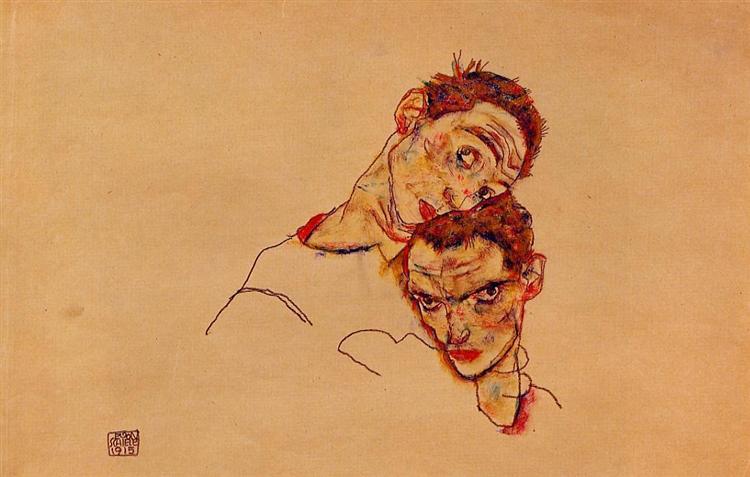Description
Egon Schiele's "double self -portrait" work, created in 1915, is a powerful testimony of the distinctive style and emotional depth that characterizes the work of this Austrian artist. Schiele is known for his bold and expressive approach in the portrait and the human figure, entering the complexities of identity and psyche. In this self -portrait, an intricate duality is displayed, where the tension between the self and the other is palpable.
Visually, the painting presents two versions of the artist himself, both represented in a color scheme that oscillates between vibrant and gloomy tones. The figures, located in the foreground, show an intimate relationship between them, although each one seems to be mired in their own subjective world. The composition is marked by a proximity dynamic, which suggests not only an internal dialogue but also an emotional conflict. Schiele's faces are visibly expressive, with accentuated features that transmit intensity and fragility. This approach is not accidental: angular contours and exaggerated gestures are characteristic elements of Schiele's technique, which often explored existential anguish and human vulnerability.
The use of color is essential for reading the work. The chosen palette includes warm and cold skin tones that contrast with each other, accentuating the difference and connection between the two figures. Earth's tones, combined with darker nuances, create an almost dreamlike atmosphere, which invites the viewer to question the reality of what he observes. This emotional ambivalence is reflected in the choice of colors, where vibrant yellow is next to the dark brown and black. The application of paint is also decisive; The surface seems almost worn into some parts, while other areas are particularly dense, as if Schiele had sought to transmit a physical sensation through its technique.
Both representations of Schiele are marked by visual elements that suggest deep introspection. There is an exploration of the self in which each figure not only observes itself, but is also questioning. In Schiele's art, this self -identity game is recurring, a reflection on the human condition, desire and loneliness. The lines that define each figure are often zigzagentes and acute, a distinctive seal of the artist's expressionist style, which seeks to decompose the conventional form to reveal the anguish and anxiety of being.
Looking at "double self -portrait", it is impossible not to feel the resonance of the anguish present in the artist's face. Schiele, who lived in a period of political and social uncertainty, emphasizes his internal struggle, a reflection of tensions that were also lived in the outside world. Expressionism, of which it was an integral part, not only sought to cause an aesthetic reaction but also an emotional response, and this work is a clear example of how it achieved it.
In the broader context of his work and the expressionist movement, "double self -portrait" stands out for his ability to capture the complexity of the artist's internal conflict, as well as his unique ability to capture the fragility of the human condition. This painting, therefore, is not just a portrait, but a mirror of the artist's own battle, inviting viewers to confront their own reflexes in the disturbances that slide between the two versions of Schiele. Thus, a dialogue between art, the observer and the very essence of being is established.
KUADROS ©, a famous paint on your wall.
Hand-made oil painting reproductions, with the quality of professional artists and the distinctive seal of KUADROS ©.
Art reproduction service with satisfaction guarantee. If you are not completely satisfied with the replica of your painting, we refund your money 100%.

